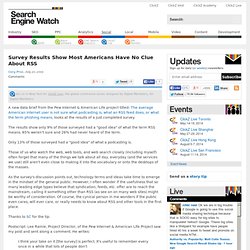

Your readers don’t want your content. I've been thinking about Rob Grimshaw's point (via PaidContent) that you can have subscribers to an online newspaper who will be happy to pay for the same content that they could get for free, and my observation that this is a case of segmentation and legitimate, non-abusive price discrimination.

Wikipedia's article on price discrimination notes that In a theoretical market with perfect information, no transaction costs or prohibition on secondary exchange (or re-selling) to prevent arbitrage, price discrimination can be a feature only of monopoly markets. Well, the web is as perfect a market as it gets. The transaction costs involved in Googling an FT.com article are near zero, and Google gives you pretty much perfect information (a direct link) about how to get what you want for free.
FT.com can hardly be said to have a monopoly on financial news. You probably got to this post by following a link on another blog, or searching Google with some generic words like "free content". Clay Shirky: Where Do They Find The Time? Canada's 1% Blogging Army. In grazing and spending way too much time on the 'net over the recent holidays, I began my slavish devotion to visiting and then categorizing every marketing communications blog in Canada (yes, insane and yet quite rewarding).

As a follow up to my Power 150 post on the Top 150 American MARCOM bloggers, below is an alphabetized list of the Power 150-ish Canadian MARCOM Bloggers - I'm calling them Canada's 1% Blogging Army. Why 1%? Canada's 1% Blogging Army: 15 Seconds with Ali Karbassi Toronto Culture Culture Surfer with a Design Eye Caveats: Hopefully, this is just the start of a budding community. The Praized Blog » Blog Archive » 5 Things You May Not Know Abou. Internet surtout une fonction de Contre-démocratie pour Rosanva. Les accros à Internet consacrent moins de temps au. Learning and KM insights - Thursday, June 15, 2006. Predicting Movie Sales from Blogger Sentiment. Pdld [Place de la Démocratie]: implication virtuelle du jeu vidé.
Reflexions sur la blogosphère et ses promesses. Survey Results Show Most Americans Have No Clue About RSS. A new data brief from the Pew Internet & American Life project titled: The average American internet user is not sure what podcasting is, what an RSS feed does, or what the term phishing means, looks at the results of a just completed survey.

The results show only 9% of those surveyed had a "good idea" of what the term RSS means. 65% weren't sure and 26% had never heard of the term. Only 13% of those surveyed had a "good idea" of what a podcasting is. Those of us who watch the web, web tools, and web search closely (including myself) often forget that many of the things we talk about all day, everyday (and the services we use) still aren't even close to making it into the vocabulary or onto the desktops of the masses.
As the survey's discussion points out, technology terms and ideas take time to emerge in the mindset of the general public. Thanks to SC for the tip. Postscript: Lee Rainie, Project Director, of the Pew Internet & American Life Project saw my post and sent along a comment. Nielsen//NetRatings: 11% of Blog Readers use RSS. Le Wiki à l'école de l'information. Le journalisme citoyen expliqué en vidéo - AgoraVox - le journal.